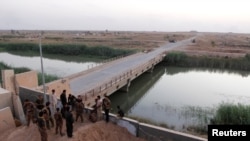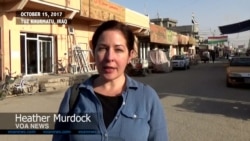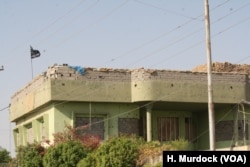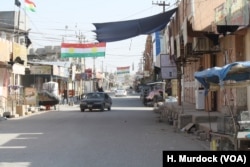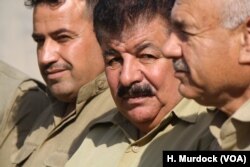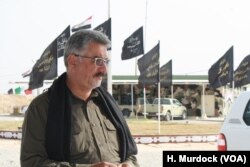On the road out of Kirkuk city, Kurdish Peshmerga forces are massed on a bridge, overlooking the countryside. Just over a nearby bream, Popular Mobilization Unit (PMU) soldiers whip down a street in large pick-up trucks, while Iraqi Army tanks lay quiet, parked in fields with their weapons pointed at Kurdish forces.
WATCH: Heather Murdock's Video Report
Everyone is staying on their own side, as the standoff continues in this oil city, which is claimed by both the Iraqi government and the Kurdistan Region’s government. Locals say they fear that if even one shot goes off in this tense intersection, it may begin a war that could devastate everyone involved.
About 70 kilometers south in another disputed — but far less coveted — city, Tuz Khurmatu, Kurdish and Iraqi forces are exchanging fire at night, as some families bunker down inside and other families flee, joining Iraq’s more than 3 million displaced.
“Last night I was on the street with my gun until 4 a.m. in case someone attacked my house,” says Nouri Hidayat, a father of three who owns a fabric store in a Tuz Khurmatu market. “If we don’t get more protection we will have to leave town.”
Baghdad says it is protecting the nation’s unity by asserting its federal authority, after Kurdistan Region residents overwhelming voted “yes” in an independence referendum opposed by Iraq’s central leadership and the international community.
Irbil, the capital of the Kurdistan Region, says by moving troops and weapons to its borders it is preparing to defend itself, after Baghdad shut down Kurdistan’s international airport and imposed other sanctions in response to the vote.
Kurdish authorities say they have been ordered to remove Peshmerga soldiers from bases in Kirkuk and that Baghdad has imposed deadlines, threatening to attack if they are not met. So far, deadlines have been ignored, and attacks have not happened.
Iraqi Prime Minister Haidar al-Abadi has repeatedly said his forces will not attack the Kurdish people but will defend Iraqi unity. Kurdish leaders likewise say they will not attack Arab forces, but will defend their lands “at any cost.”
Flashpoint
Tuz Khurmatu is a diverse city of Arabs, Turkmen and Kurds, and recent late-night battles between the PMUs and Peshmerga have everyone on edge. On Friday, fighting broke out around 11 p.m. and gunfire, grenades and mortars blasted through the night.
“The situation is now calmer as PMU leaders and Peshmerga are in negotiations,” explains Mam Wahab Suri, a Peshmerga deputy commander in his base in Tuz Khurmatu on Saturday. “But they are getting stronger and they want to kick us out.”
Conflicts in this area have been going on since the days of Saddam Hussein, he says, and Kurdish efforts to reduce tensions by withdrawing from some non-Kurdish parts of town have backfired. PMUs have claimed victory after they occupying a former Peshmerga base, galvanizing their fighters.
Some Peshmerga bases in non-Kurdish areas around Kirkuk have also been abandoned in recent days. Peshmerga leaders say the move was to create space between the forces but some Iraqi forces have said Kurdish soldiers are retreating.
In the Tuz Khurmatu market, a few motorcycles zip by and two women examine goods at a nearby grocery. Normally, the street is so packed on a Saturday that it is hard to walk from one end to the other, says Ziad Najjam, 30, a Kurdish baker. Many families are either hiding inside, getting ready to leave or have already left, he says.
“The problem is, the PMUs here are not really one group,” he says. “The Kurdish authorities can make a deal with one group of PMUs and then get attacked by another.”
Further north just outside of Kirkuk, Zaki Muratti, a Turkmen PMU commander says the exact opposite problem is also exacerbating ethno-religious tensions that have ignited since the referendum. His unit, he says, has never quarreled with local Kurdish authorities but they are now not allowed to enter Kirkuk in uniform.
And all the residents of Kirkuk and other disputed areas are in equal danger regardless of their ethnicity if Baghdad and Irbil move past posturing to fighting, he adds.
“I guess we will all be the first to die,” he says. “Because we are in the middle.”




